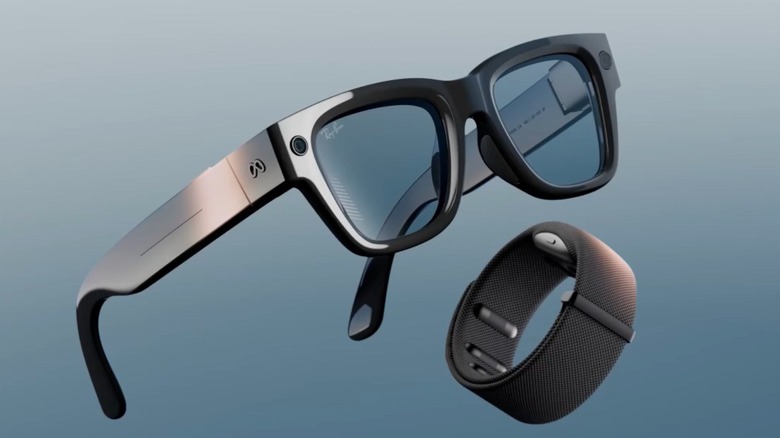Meta's New AI Glasses Look Great, But There's A Smart Reason Not To Buy Them
Meta has a new pair of smartglasses to offer, and this time around, the company is eyeing the true face of personal computing. It's quite literally a monocular display on your face. The latest from Meta is the Ray-Ban Display, which puts a screen on the right lens. This display won't exactly break any pixel density records, but it's good enough to act as a viewfinder for clicking pictures and recording videos, texting, playing music on the go, checking sports scores, taking video calls, and visual map guidance.
On the more practical side, they will also serve AI-powered translations in real-time and use Meta AI to make sense of the world around you. Of course, it's deeply baked into the Meta communication trinity of WhatsApp, Messenger, and Instagram, so you can engage socially to your heart's content. Meta is essentially trying to accomplish what Google Glass couldn't, and with Ray-Ban styling on its side.
Another massive perk is the way you control them. Instead of talking to the onboard mic, or fumbling with the on-temple touch controls, Meta is bundling an EMG wristband that comes with the $799 package. Called the Neural Band, it relies on hand gestures, specifically the thumb and index finger. Think of them as the gestures that are already available on the Apple Watch, but more advanced and accurate. Overall, the idea is pretty appealing, and pundits have already started calling it the future of personal computing and the natural evolution of phones.
Let history be your guide
Meta's big pitch for the Ray-Ban Display is private computing. Meta uses that word four times on the product page, and the keynote event also pushed on that idea. History, however, paints a different picture: Aside from the usual social platform safety claims, Meta says it is also taking care of security with the wireless pairing bridge, thanks to "encryption and secure device connection with your Meta Ray-Ban Display glasses and your Meta Neural Band." All those claims are reassuring, and the least buyers can expect, but the demon of privacy scares continues to chase Meta.
Earlier this month, Attaullah Baig, former head of security for WhatsApp, filed a lawsuit against Meta over some pretty concerning privacy violations. Biag's lawsuit notes that "thousands of WhatsApp and Meta employees could gain access to sensitive user data including profile pictures, location, group memberships and contact lists," reports The New York Times.
Interestingly, a big part of Mark Zuckerberg's presentation at the Connect event was the seamless communication facility on the Ray-Ban Display smart glasses. He showed off texting, and even tried to accept WhatsApp video calls, though the demo failed repeatedly. Back in 2018, WhatsApp chief Jan Koum quit over privacy-related tussles with Meta (Facebook, at the time). In July, Meta settled for a staggering $8 billion fine over violations of its privacy commitments. The list is long, but the future seems bleak, especially in the age of AI.
AI opens a whole new world of risks
Meta AI was also a key element of Zuckerberg's keynote presentation. In fact, Meta has pushed numerous AI models into the open-source domain and has deeply integrated its multi-modal AI within products such as WhatsApp, Instagram, and Messenger. AI, unfortunately, opens a whole new world of risks and privacy compromises, more so than social media. Companies that are building AI are facing lawsuits for illicitly using material to train their AI models, and not many of them offer a complete exit route for users to block this behavior.
In 2024, Meta admitted that it had scraped public posts and photos to train AI, and earlier this year, it formally announced plans to use EU users' Facebook and Instagram data for the same chore. Imagine giving a company wholesale access to whatever you see through a camera, your social posts, and voice interactions via the Ray-Ban Display glasses. And let's not forget the inherent risks that come with AI interactions.
In August, Reuters reported the case of a cognitively impaired retiree who fell in love with a flirty chatbot on Facebook Messenger. They went to meet the chatbot (which has the persona of a young woman) in New York, fell near a parking lot, and later succumbed to the injuries. The Washington Post also highlighted a case where an Instagram chatbot assisted teens with planning a suicide. The idea of putting a private computer on your face and running an AI chatbot is risky for more reasons than one. It's a grim thought, and one that should dictate buying decisions.


